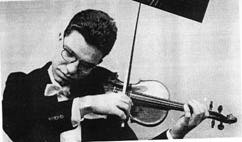
The 35-piece orchestra founded in 1987 has been reinforced lately by local professionals and several foreigners mainly in the wind section and is now working with professional routine. With their experience and under the competent guidance of Conductor Ayis Ioannides, the orchestra has improved almost beyond recognition.
This was obvious from the opening bars of Beethoven's Triple Concerto for piano, violin and violoncello in C, op. 56. The first rate soloists of the visiting ODYSSEUS TRIO: cellist Kerstin Felz, violinist Thomas Meining and pianist Arkadi Zenziper interacted brilliantly. The orchestra played with great aplomb and such was the confidence of Conductor Ayis Ioannides that he used no score.
The string orchestra then performed Sibelius' Romance in C, op.42 with great skill and the full orchestra brought the evening to an impressive close with a poignant rendition of Mozart's popular Symphony Nr.40 in G. minor, KV 550 to the audience's delight.


The newest cultural venue of Nicosia,
Casteliotissa Hall, was inaugurated
last December. Situated near Paphos Gate, Casteliotissa lies within the
grounds of an old Dominican Monastery
and a Lusignan palace.
According to the evidence of contemporary writer Willibrand of Oldenburg in 1211, the church of St. Clare, known as Castigliotissa or Chastillonnette existed on the site of the former castle which, at that time was being rebuilt. The presence of the convent of St. Clare was mentioned again in 1300 and 1310 by chronicler Florio Bustroni.
Much later, in 1847, the French historian Mas Latrie came across this hall which was being used as a munitions depot by the Ottomans and recognized it as a part of the old palace which fitted the descriptions of Lusignan chroniclers: Etienne de Lusignan, Florio, Bustroni, Amadi and Strambaldi.
By 1920, however, Casteliotissa was being used as a petrol store and it was not until 1938 that it finally passed into the hands of the Department of Antiquities. Work carried out over the past few years has finally restored the hall, one of only two remaining Lusignan buildings in the free part of Nicosia, creating a welcome addition to the cultural venues of the capital. The restoration work was carried out in full observance of the original Gothic style and traditional materials.
Most appropriately, the Casteliotissa Hall was inaugumted with a concert of Medieval music. The programme included works by the famous Manuscript of Cyprus found at the Turin National Library - a unique collection of 15th century music. The manuscript was probably commissioned by Charlotte de Bourbon, second wife of King Janus ( 1398-1932), who came to Cyprus in 1411. It contains a unique polyphonic repertory of some 218 pieces namely one Mass, seven Gloria Credo pairs, three Glorias, thirty-three Motets six French sacred pieces and 1613 secular pieces. It also contains monophonic Mass ordinary cycles and Oifices for St. Hilarion and St. Anne. All the pieces of the repertory are "unique and anonymous and are not found in any other manuscripts." (Richard M. Hoppin).
French singer Jean Belliard made a welcome return to Cyprus to perform once again, this time joined by the "Ensemble Guillaune de Machaut". The group founded in 1973, with Belliard as co-founder includes also musicians Francois Fevrier, Serge Delmas, Dominique Lauthier, Jean Luc Redureau whose common aim and interest is to research and perform early music. Today they have established an extremely high reputation in their specialized field by participating in renowned festivals throughout France, Europe, United States, Japan, Hong-Kong etc.
For their performance in Cyprus the French musicians were joined by three Cypriot musicians: Costas Charalambides, Evagoras Karayiorgis and Yiannakis Souroulas.



|

|

|

|
NOTE: You need Radio
Player to listen in real time the above
broadcasting stations.

What follows are the lyrics(in Latin characters) of the songs of our favorite music album, ES GHN ENALIAN KYPRON, which is dedicated to Cyprus. The songs were performed by a Greek singer, George Dalaras, with the assistance of the chorus Diastasi. Throughout these songs, the composer wants to send to the outside world, the message that Cyprus is Greek, and nobody can change our believes through the centuries. He also emphasizes that those (different countries, enemies of Cyprus) who believed that they could change our believes and faith, were wrong. He also reminds us about the refugees, the missing people, the people who died fighting for the freedom of our country against the Turks, the beauties of the towns that are under Turkish occupation today, and states that we should never forget them, because one day, everything that we lost after the Turkish invasion, will be ours again.
 ES GHN ENALIAN KYPRON
ES GHN ENALIAN KYPRON


RETURN ![]() TO THE CYPRUS ACCESS PANEL
TO THE CYPRUS ACCESS PANEL